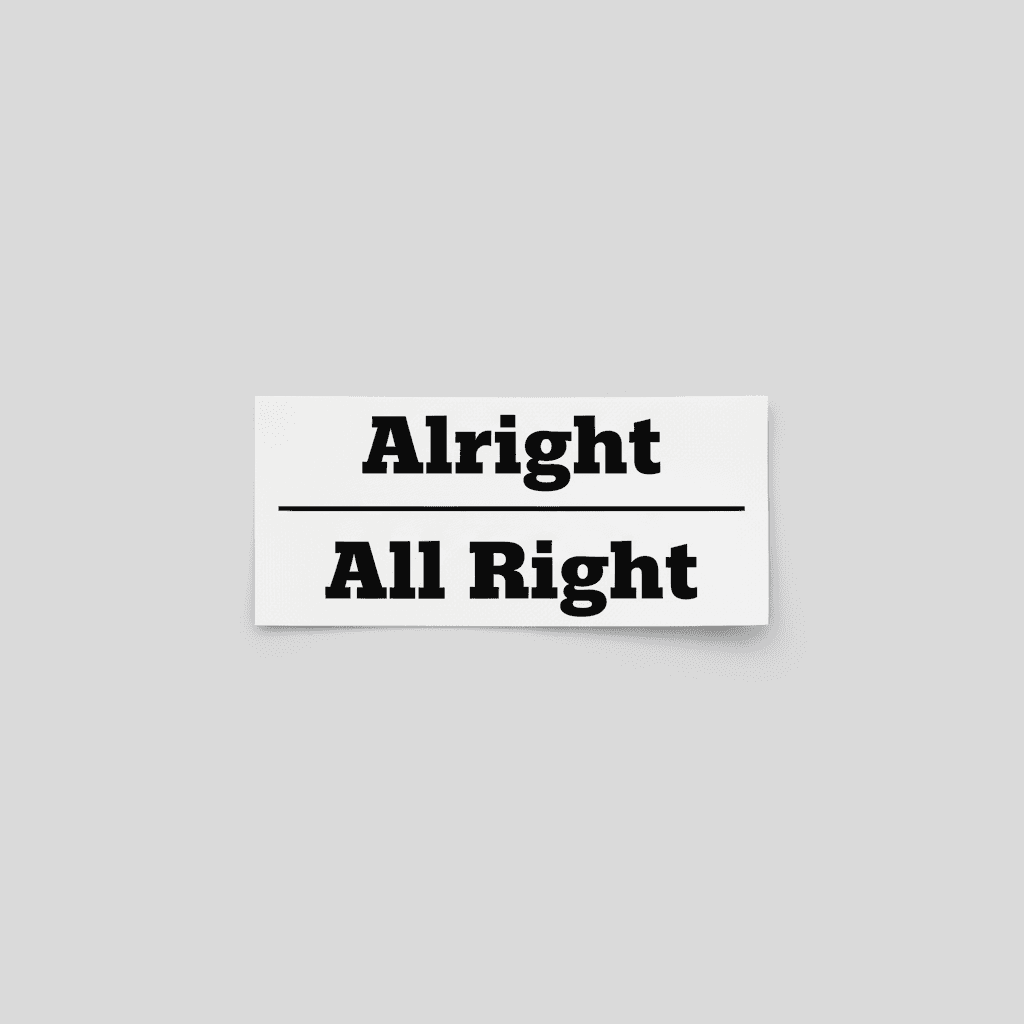Alright vs. All Right: Which Is Correct?
 Both alright and all right mean the same thing — okay, fine, or satisfactory — but they differ in formality and acceptance.
Both alright and all right mean the same thing — okay, fine, or satisfactory — but they differ in formality and acceptance.
Here’s the short answer:
- ✅ All right → Standard and correct in all types of writing.
- ⚠️ Alright → Informal and often avoided in formal English.
1. All Right: The Standard Form
Meaning
“All right” is the traditional and grammatically correct spelling.
It’s used in both formal and informal writing and means okay, fine, or satisfactory depending on the context.
Examples (10 total)
- Are you all right?
- Everything will be all right in the end.
- The report looks all right to me.
- She said the trip was all right, not great.
- I’m feeling all right now, thanks.
- The teacher said my essay was all right.
- It’s all right if you can’t come tonight.
- Is your car all right after the accident?
- Don’t worry — it’s all right to make mistakes.
- The movie was just all right, not amazing.
🧠 Tip:
If you’re writing an essay, article, or anything formal, always use all right.
2. Alright: The Informal Variant
Meaning
“Alright” is a modern, informal spelling of all right.
It’s common in casual writing, song lyrics, and dialogue, but many editors and teachers still mark it as incorrect in formal English.
Examples (10 total)
- “It’s gonna be alright, don’t worry.”
- “You doing alright today?”
- The text message read: “I’m alright, see you soon.”
- That song, Everything’s Gonna Be Alright, is so catchy.
- The kids seem alright after the long trip.
- “Are you alright?” he asked gently.
- It’ll be alright — just trust me.
- The doctor said she’s doing alright now.
- “Alright then,” he said, standing up.
- It’s an alright day, nothing special.
🧠 Tip:
Use alright in casual writing only — text messages, social media, or creative dialogue.
3. Quick Comparison Table
| Form | Correctness | Tone | Example | Usage |
|---|---|---|---|---|
| All right | ✅ Standard | Neutral / Formal | Everything is all right. | Essays, reports, business writing |
| Alright | ⚠️ Informal | Casual / Conversational | You doing alright? | Texts, music, dialogue |
4. How to Remember the Difference
👉 All right = everything is “all correct.”
👉 Alright = looks simpler but less accepted.
💡 Memory Trick:
If your teacher or boss will read it — use all right.
If your friends will read it — alright is fine.
5. Common Mistakes
❌ I hope you’re alright after the fall.
✅ I hope you’re all right after the fall.
❌ The results look alright to me (in formal writing).
✅ The results look all right to me.
6. Why Both Exist
Writers began using alright in the late 1800s as a faster, simplified form — similar to how already replaced all ready.
However, grammar authorities (like Oxford, Cambridge, and Merriam-Webster) still recognize all right as the preferred and standard spelling.
Even AI tools may mix the two, but Humanizey helps ensure your writing uses the right tone and style automatically.
FAQs
1. Is “alright” grammatically wrong?
Not exactly — it’s just nonstandard. It’s fine in informal settings but avoid it in formal writing.
2. Can I use “alright” in dialogue?
Yes! It’s common in novels, screenplays, and conversations to show natural speech.
3. Is there a difference in meaning?
No, alright and all right mean the same thing — only tone and formality differ.
4. Which one do dictionaries prefer?
Most major dictionaries list all right as the main form and alright as a variant.
Practice: Choose the Correct Form (“All Right” or “Alright”)
(Answers are listed at the end.)
- Are you feeling ___ after the trip?
- Everything’s gonna be ___, don’t worry.
- The essay looks ___ to me.
- It’s ___ if you don’t want to go out tonight.
- “___, I’ll do it,” he said reluctantly.
- Is your computer ___ now?
- That new song sounds just ___.
- It’s ___ — mistakes happen.
- The kids seem ___ after the long drive.
- The doctor said I’ll be ___ in a few days.
Answers
- all right
- alright (casual) / all right (formal)
- all right
- all right
- alright
- all right
- all right
- all right
- alright (casual) / all right (formal)
- all right
